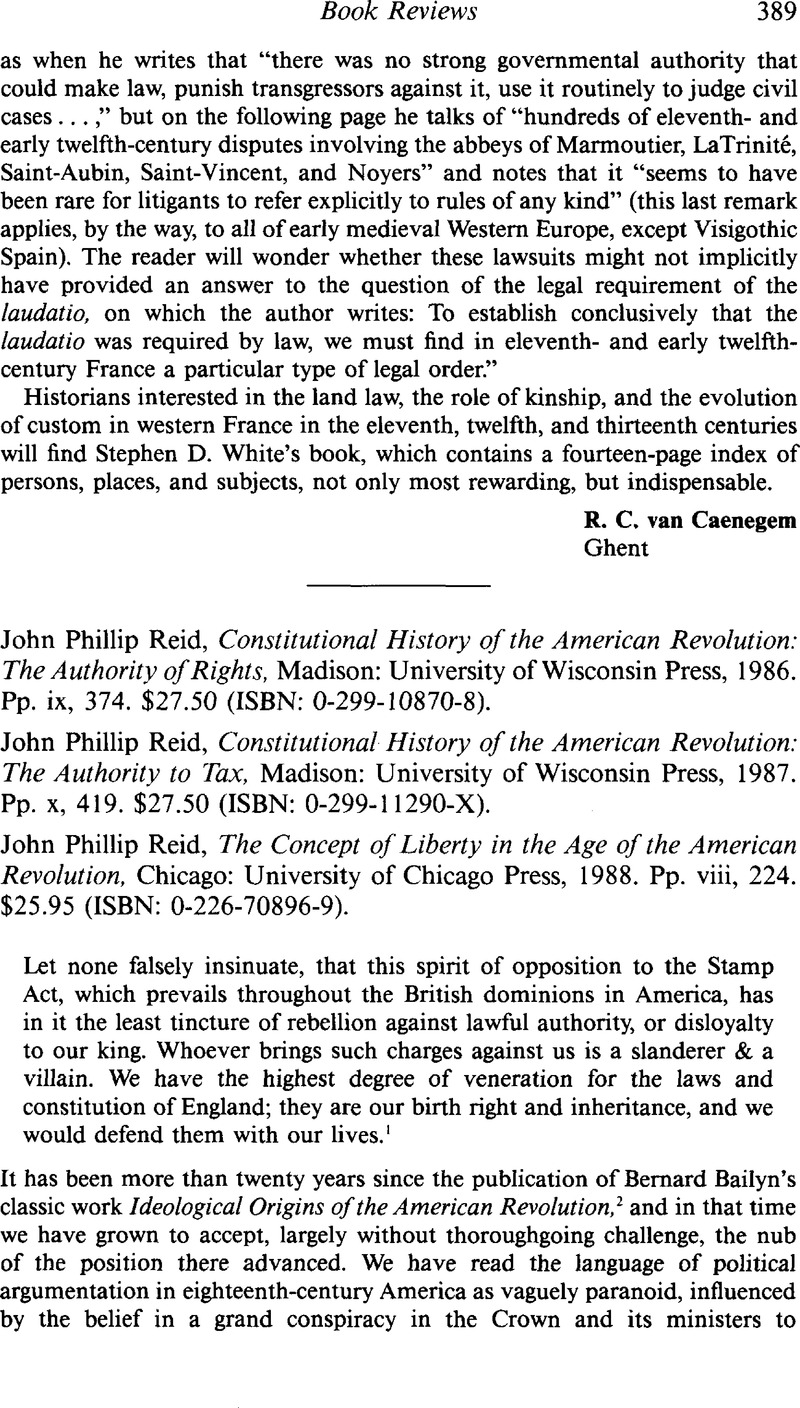No CrossRef data available.
Article contents
John Phillip Reid, Constitutional History of the American Revolution: The Authority of Rights, Madison: University of Wisconsin Press, 1986. Pp. ix, 374. $27.50 (ISBN: 0-299-10870-8). - John Phillip Reid, Constitutional History of the American Revolution: The Authority to Tax, Madison: University of Wisconsin Press, 1987. Pp. x, 419. $27.50 (ISBN: 0-299-11290-X). - John Phillip Reid, The Concept of Liberty in the Age of the American Revolution, Chicago: University of Chicago Press, 1988. Pp. viii, 224. $25.95 (ISBN: 0-226-70896-9).
Published online by Cambridge University Press: 28 October 2011
Abstract

- Type
- Book Reviews
- Information
- Copyright
- Copyright © the American Society for Legal History, Inc. 1991
References
Notes
1. Philopatriae, in The Constitutional Courant, Sat. 9/21/1765, at 9.
2. B. Bailyn, Ideological Origins of the American Revolution (1967).
3. See Wood, , Rhetoric and Reality in the American Revolution, 23 Wm. & Mary Q. 3 (1966CrossRefGoogle Scholar).
4. The locus classicus of this position is probably 12 L. H. Gipson, The British Empire Before the American Revolution (1970).
5. See, e.g., E. S. Morgan, The Challenge of the American Revolution (1976); Black, B., The Constitution of Empire: The Case for the Colonists, 124 U. Pa. L. Rev. 1157 (1976CrossRefGoogle Scholar).
6. See 1 Pamphlets of the American Revolution, 1750-1776 (B. Bailyn ed. 1965).
7. Although Reid gives full weight to the most important line of scholarly endeavor casting doubt on the myth of American Lockeanism, namely the work of J. G. A. Pocock and others, he is equally dissatisfied with these historians of civic republicanism. Their approach, he claims, has underestimated the importance of what Joyce Appleby calls the “historic rights tradition” as an alternative to the “civic republican” tradition. See Appleby, J., Capitalism and a New Social Order: The Republican Vision of the 1790s 18 (1984Google Scholar). For Reid, Appleby's “historic rights tradition” is “remarkably close to … a restatement of common-law constitutionalism,” (Concept of Liberty, 6). In short, the historians of civic republicanism, as Reid sees it, have made the same error as their opponents: they fail to observe the “taught tradition” as the true source of American political ideology.
8. See Palko v. Connecticut, 302 U. S. 319, 325 (1937).
9. This is no ground for censure; imagination is a sine qua non of illuminating historical writing, and identification always will be a powerful spur to imagination. Should it be a weakness, it is an amiable one, to which Reid's counterpart has also been subject in his time. See B. Bailyn, The Ordeal of Thomas Hutchinson (1974), in which, at least to me, Hutchinson bears a remarkable resemblance to a patrician university professor sharply beset by the irrational politics of student revolt.
10. This trenchant and descriptive term was first applied to that past master of the method, Christopher Hill. See Hexter, J., The Historical Method of Christopher Hill, in On Historians 241 (1979Google Scholar).
11. Here a word of castigation should be given concerning the antisocial parsimony of publishers, who, to save costs of typesetting, place notes at the end of the volume, thus rendering them largely unusable. Reid, or perhaps his editors, have made matters worse by restricting the frequency of citation to one footnote a paragraph, thus requiring the reader to reconstruct from an omnibus footnote which documents were quoted in the second sentence of the paragraph and which in the third.
12. 1 Holmes-Laski Letters 542 (Howe, M. ed. 1953Google Scholar).
13. Nor is Reid always as charitable as he might be in decreasing the reader's load, as when a quotation from Blackstone is cited, correctly but unhelpfully, only to an issue of the Boston Evening Post of 1773. See Concept of Liberty at 78; Boston Evening Post, 1 March, 1773, at 2 col. 3 (quoting 1 Commentaries … 137). This seems to carry a fondness for the press and periodical literature a trifle too far.
14. Bailyn's Ideological Origins, for example, progenitor and opponent though it is, is discussed only once in the three volumes, Concept of Liberty, 6-8. There Reid makes the crucial point that Bailyn's view of American political ideology fails to explain the reliance of American and British writers on the same sources of authority for constitutional argumentation. The advantage of Reid's interpretive approach is that it shows how both adversaries could have believed themselves in the “mainstream” of Anglo-American political thought, without adopting the unfortunate assumption that the Americans misunderstood their own position, believing themselves sane when they were actually slightly deranged.


